175 Years of Shipowning and Enterprise
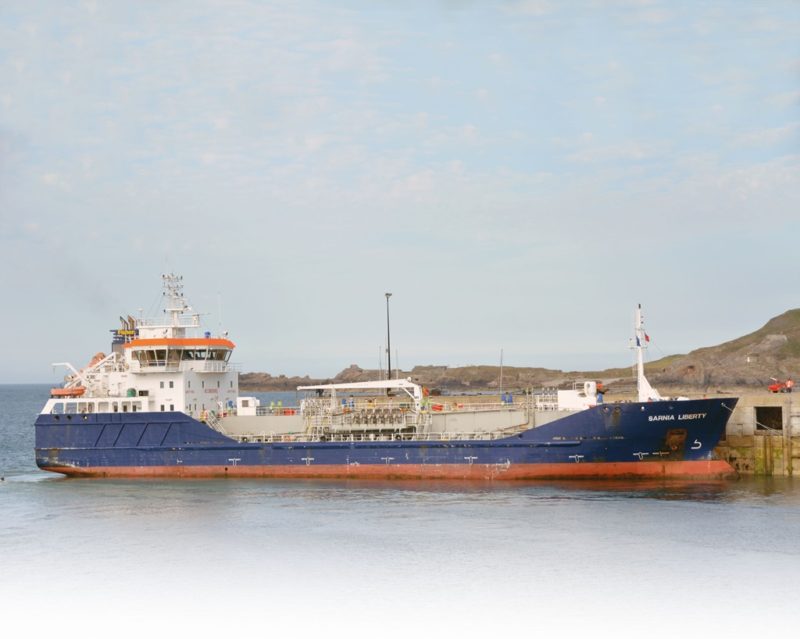
The Fisher fleet in 1973 comprised a dozen owned coasters with seven other vessels managed for other owners. The owned coasters were the container carriers Orwell Fisher and Solway Fisher of 1,374 grt and built in 1968 by the Van der Werf yard at Niemegen for an Irish Sea charter between Preston and Dublin and Belfast. General cargo coasters included Derwent Fisher of 1,467 dwt built in 1966 at Groningen, Eden Fisher of 1,519 dwt built at Foxhol in 1965, the sisters Guernsey Fisher and Jersey Fisher of 1,495 dwt built by the Ijsselwerf yard at Rotterdam in 1972, Leven Fisher of 2,355 dwt built in 1962 at Burntisland, Pool Fisher of 1,360 dwt built in 1959 at Foxhol, Lune Fisher of 1,296 dwt also built at Foxhol in 1962 for a charter between the Channel Islands and Southampton carrying tomatoes, fruit and flowers, and container ship Brathay Fisher of 3,604 grt and built by the Van der Werft yard at Deest in 1971. The twin CEGB heavy lift ships, Aberthaw Fisher and Kingsnorth Fisher, completed the fleet.
Pool Fisher had a tragic sinking in bad weather on 6th November 1979 off the Isle of Wight with the loss of thirteen lives while on a voyage from Hamburg to Runcorn with bulk potash. The probable cause at the subsequent enquiry was water ingress into the fore part of the ship through a failure to batten down number one hatch properly.
Sir John Fisher was Chairman of the company in 1973, with William Eccles as Managing Director and two other directors. The company had ownership of the Port of Newhaven and Port of Heysham, with Newhaven handling fruit and vegetable imports into a cool store until sold to new owners in June 2001, and Heysham closed in late 1995. A larger three hold general cargo ship of 3,250 grt and 5,000 dwt was purchased as Weser Agent in 1974 and renamed Neptune Fisher for a two year time charter in the Far East but was sold at the end of the charter. Brathay Fisher was renamed Calderon in 1976 for a two year container charter to MacAndrews & Company, and then regained her name for a three year container charter to Sealink at the end of which she was sold in 1981. Jersey Fisher began a five years charter to Commodore Shipping Ltd. of Guernsey as Commodore Challenger in 1978, and then traded around the Clyde area as Loch Awe until sold in 1990. Guernsey Fisher was renamed Scafell in 1984 and worked alongside the barge Odin at Whitehaven on transhipment of phosphates.
Several container ships were bare boat chartered to Bell Lines in the late 1970s and renamed Bell Raider, Bell Rebel, Bell Renown, Bell Resolve, Bell Ruler and Bell Reliant. A fifteen year charter was obtained to Sealink (UK) Ltd. for the Stranraer to Larne service for the new ro-ro ferry Darnia in 1978, and a ten year charter was obtained for the similar ro-ro ferry N.F. Jaguar to the Isle of Man Steam Packet Co. Ltd. in 1982 and she was renamed Peveril.
Shamrock Shipping Ltd. of Belfast was acquired in 1982 with five dry cargo coasters named Malone, Edgar Dorman, David Dorman, Shamrock Endeavour and Shamrock Enterprise. Onesimus Dorey (Shipowners) Ltd. of Guernsey was purchased in 1983 with three general purpose coasters carrying coal to Guernsey and Jersey named Rocquaine, Belgrave and Perelle. Belgrave was transferred to Alexander Partners Shipbrokers in 1994 and renamed Oakland, but went aground on West Mucks Reef on 6th February 1998 while on a voyage from Buckie to Belfast with distiller’s pellets. She was refloated by the tug Kintore and proceeded under her power to Leith arriving six days later. After discharge, she was found to have extensive bottom damage and was sold for breaking up.
Coe Metcalf Ltd. was purchased in 1984 from Booker McConnell of Liverpool for £1.4 million with a fleet of four general dry cargo coasters, five coastal tankers, and three surveying drillships.
These ships were named as follows:-
Dry Cargo (4) Firethorn, Hawthorn, Quickthorn, Osor
Tankers (5) John M, Frank M, Nicholas M, Frederick M, Robert M (bitumen)
Drillships (3) Pholas, Gorsethorn, Whitethorn
Coe Metcalf was a merger of two shipowners in S. William Coe of Liverpool and Metcalf Motor Coasters of London. The merger brought Fishers a new trade with its first five coastal tankers, having never owned any before, and which was to become very important to the company later.
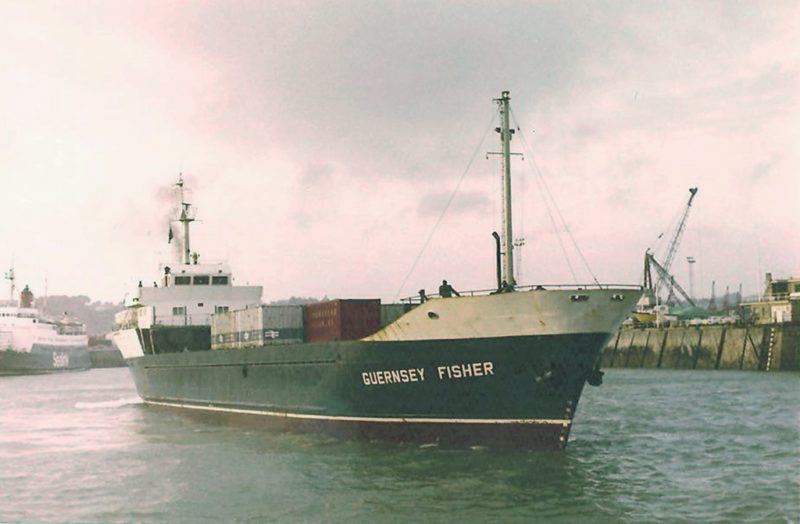
Pholas had been built as Elizabeth Bowater in 1958 for Bowater Paper to bring cargoes of wood pulp from Botwood in Newfoundland to the U.K. to make newsprint. She was converted in 1982 into a survey ship named Wimpey Sealab with a yellow hull on charter to the National Coal Board to prove the undersea coal reserves off the Durham coalfields were worth exploiting. Pholas was given a red hull for two years of profitable surveying and drilling, but in 1986 drilling rates in the offshore market had declined as the price of oil dropped, and all three survey and drillships were laid up. Gorsethorn was sold off in 1990, Pholas in 1995 and Whitethorn in 1997. Pholas was renamed Norskald by DSND Survey K/S of Oslo, and continued in her survey work, with her last job being a geological survey of the Straits of Gibraltar for a proposed tunnel connection between Europe and Africa. She was laid up at Haugesund in March 2000, and arrived at Esbjerg in tow on 12th November 2002, staying until she was sold for breaking up in Liepaja in June 2003 after a career of 45 years.
The fleet of Hunting & Son of Newcastle took delivery in 1977 of its last newbuilding Thamesfield of 50,200 dwt, a forestry products carrier from the Flensburg yard in Germany and traded from Port Alberni and Vancouver to Tampa in Florida with timber. She was still very much a member of the Hunting fleet when trading from British Columbia in 1981.
In that year, an offer came suddenly from a company which had a 29% holding in Stag Line of North Shields to sell these shares to Hunting, this was from Ropner Holdings Ltd. of Darlington. Hunting was then able to make a successful bid of £5.3 million for Stag Line, and this was accepted by the Stag Line directors of the Robinson family as being in the best interests of all concerned. Stag Line became a wholly owned subsidiary of Hunting Gibson Ltd. in April 1981, and Hunting Stag Management Ltd. was then set up in Newcastle to absorb the sea-going and shore-based staff of the two companies and to manage the Hunting and Stag Line dry cargo fleets.
Hunting Stag Management Ltd. was sold in July 1982 to James Fisher & Sons Ltd. of Barrow for £3.8 million with two million in cash, £800,000 in Fisher shares, and the balance in the form of a Bill of Exchange which matured on 30th June 1984. The price included bulker Thamesfield and a Stag Line coaster, but not the last two Stag Line bulkers, which were sold a year later to Singapore shipowners. Thamesfield was registered under James Fisher & Sons Ltd. from 1st July 1984, and the Newcastle office of Hunting Stag Management Ltd. closed for the last time in March 1985 and moved to Barrow.
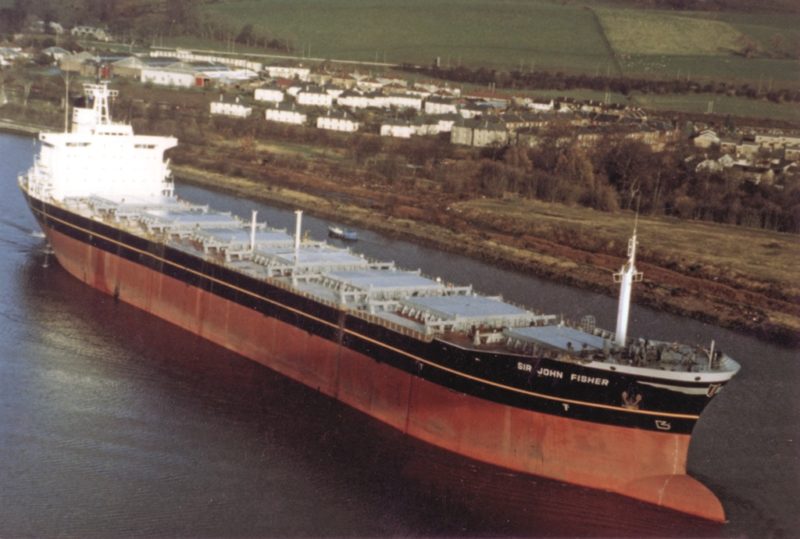
Fisher had ordered a large bulker of 67,638 dwt of its own from the Govan yard of British Shipbuilders Ltd. in 1980 to add to its fleet of 22 ships, which was launched as Sir John Fisher on 8th June 1982 and she was completed in 1983 powered by a B & W ‘long stroke’ diesel engine of 15,400 bhp at 106 rpm to give a service speed of 15 knots. She carried a crew of thirty, but unfortunately her first two year charter to Asia Maritime made a big loss of $15,000 per day, and she was quickly sold off in 1985 having cost Fishers a huge loss of £21 million to venture into the deep sea bulk trades.
Pacific Peace and Pacific Patriot were the Govan built sisters of Sir John Fisher in 1982 for Far East owners. A joint venture with Venisol Shipping of Panama from 1985/86 with the bulker Nerezine of 34,400 dwt and two smaller ships fared better and lasted until 1990/91.
Sir John Fisher had retired as Chairman of the company in 1976, and later sold his shares in the company to set up the Fisher Foundation in 1980 before his death, as he had no sons or daughters to carry on the family dynasty.
Two Chairmen later, David Cobb was appointed Executive Chairman of Fishers in May 1994 with a brief to take the loss making company out of the red, from a pre-tax loss of £5.6 million for 1993. David Cobb was born in Glasgow in 1936 and had a long career in shipbuilding and shipping after joining the Fairfield yard as an apprentice, and then moved to work at the St. John Shipbuilding & Dry Dock Company in Canada in 1959. He returned to Selby in 1964 to become Managing Director of Cochrane’s shipyard, with a later order for two large tugs secured from the Ingram Corporation of New Orleans. The portfolio of Ingram Corporation included tanker owning, shipbuilding, marine insurance, oil, energy and pipelines, and David Cobb became a Vice President for Ingram in 1969.
In 1970, he was the architect behind the Ingram purchase of Rowbotham Tankships Ltd. of London, managing the Rowbotham fleet of 23 coastal tankers from 1973.
Under the leadership of David Cobb, Fishers paid £39 million on 31st December 1996 for seventeen clean product tankers ranging from 2,500 dwt to 11,000 dwt purchased from P. & O. Tankships Ltd. This fleet was none other than the old Rowbotham Tankships Ltd. business that David Cobb had managed for a number of years.
David Cobb retired as Executive Chairman of Fishers on 31st December 2001, having also made successful profits in the cable laying field with the cable layer C. S. Nexus, purchased in 1993 and formerly the drillship Pelican built in 1972 by the IHC Gusto yard at Schiedam. Several loss-making dry cargo coasters were also sold off during his tenure, including the oceanographic support ship Zealous, formerly Seaforth Clansman built in 1978 by Cochrane of Selby.
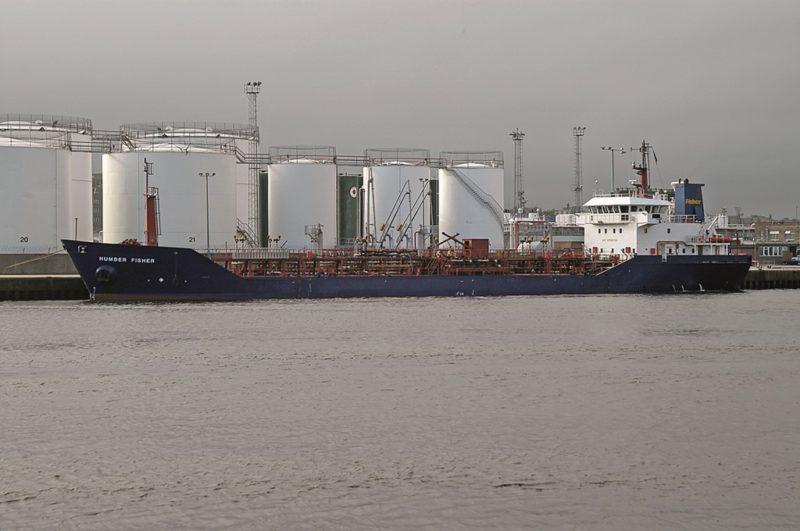

In 1998, the Fisher Tankships Ltd. fleet comprised 23 coastal tankers managed and chartered from London, six dry cargo coasters managed from Liverpool, and six other irradiated nuclear fuel carriers managed for British Nuclear Fuels Ltd. (BNFL). Coe Metcalf Shipping Ltd. had been renamed James Fisher (Liverpool) on 1st December 1995 with an office at the Martins Bank Building in Water Street in Liverpool.
The 1998/99 Fisher fleet was as follows:-
Name Grt Built
- Rudderman 4,842 1994 Rowbotham tanker
- Steersman 4,842 1994 Rowbotham tanker
- Chartsman 4,842 1993 Rowbotham tanker
- Anchorman 4,842 1993 Rowbotham tanker
- Stellaman 2,807 1980 Rowbotham tanker
- Northgate 1,599 1981 Rowbotham tanker
- Westgate 1,599 1979 Rowbotham tanker
- Eastgate 1,599 1979 Rowbotham tanker
- Irishgate 1,599 1981 Rowbotham tanker
- Tillerman 7,686 1975 Sold in 1999 renamed Azalea
- Tankerman 5,881 1983 Severn Fisher in 1998, lengthened in 2000
- Cableman 4,916 1980 Renamed Lough Fisher in 1998
- Oarsman 1,550 1980 Rowbotham tanker
- Thames Fisher 2,760 1997 Built at Barrow
- Mersey Fisher 2,760 1998 Built at Barrow
- Humber Fisher 2,760 1998 Built at Barrow
- Solent Fisher 3,368 1997 Built at Shanghai
- Forth Fisher 3,368 1997 Built at Shanghai
- Galway Fisher 3,368 1997 Built at Shanghai
- Milford Fisher 3,368 1998 Built at Shanghai
- Wear Fisher 2,077 1980 Formerly David M, BP Harrier
- Tees Fisher 2,077 1980 Formerly Michael M, BP Hunter
- Tyne Fisher 1,803 1980 Formerly Frederick M
- Solway Fisher 1,707 1977 Built as dry cargo Procyon, purchased 1996
- Briarthorn 1,576 1980 Dry cargo, formerly Craigallian
- Redthorn 2,075 1978 Dry cargo
- Silverthorn 1,213 1982 Dry cargo, formerly Shamrock Enterprise
- Rosethorn 1,213 1982 Dry cargo, formerly Shamrock Endeavour
- Rockisland 1,277 1978 Dry cargo, formerly Verena
- Pacific Swan 4,473 1979 Managed for BNFL
- Pacific Crane 4,510 1980 Managed for BNFL
- Pacific Teal 4,863 1983 Managed for BNFL
- Pacific Sandpiper 5,050 1985 Managed for BNFL
- Pacific Pintail 5,271 1987 Managed for BNFL
- European Shearwater 2,493 1981 Managed for BNFL (Mediterranean Shearwater
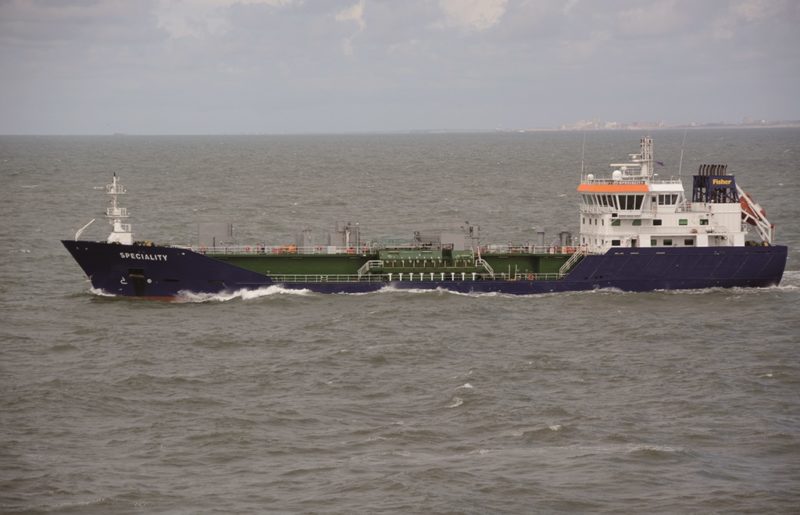
DIVERSIFICATION AFTER THE MILLENNIUM
The major shareholders in James Fisher & Sons PLC at the Millennium were the Fisher Foundation (25%) set up by the late Sir John Fisher and his wife Lady Maria Fisher, R. F. Hart Jackson (35.2%), Prudential Insurance Company (8.5%) and Hill Samuel Bank (6.3%), with the remaining 25% of shares held by minority shareholders. David Cobb was the Executive Chairman, the other directors were Trevor C. Hart, Ian Serjent, Angus Buchanan, M. J. Shields, Terry Blyth, Terry Moore, Sir David Hardy, Sir Julian Oswald and Sir David Thomas. David Cobb had successfully steered the company into profit, with a profit of £2.28 million on a turnover of £32.2 million at the end of 1994, £5.3 million on a turnover of £30.2 million at the end of 1995, and £9.3 million on a profit of £42.9 million at the end of 1997.
Tim Harris was formerly with P. & O. and took over as Chairman of the company on 1st January 2002 from David Cobb. Mr. Harris also farmed organically in Norfolk on a 210 acre holding. He made his first decision for the company by ordering three new tankers to replace eight smaller coastal tankers built in the 1980s. A pre-tax profit of £8.1 million was made by the end of 2001, rising to £9.7 million by the end of 2002, with the cablelayer C. S. Nexus laid up at the end of the year at the end of her charters to Cable & Wireless Ltd. after laying fibre optic cables between the U.K. and Spain as well as the JIH (Japan Information Highway) in the Indian and Pacific Oceans in 1998. She was also on long term charter to Alcatel Submarine Networks, with a capacity to store 7,700 tonnes of submarine cable in her cable tanks with the cable laid by a linear cable engine through twin stern sheaves. She was sold for breaking up in April 2004 after a career of 32 years.
Fisher exited the dry cargo sector in March 2001, which had produced an operating loss of £956,000 in 2000, and had dragged down overall profits to £6.6 million for the year. Solway Fisher and Redthorn were sold during 2000, and Briarthorn, Rosethorn and Silverthorn were up for sale at the time of the announcement. Two cablelaying ships were delivered by the Victor Lenac shipyard in Croatia in April and June 2002, Oceanic Princess and Oceanic Pearl, for charter to International Telecom of the U.S.A. Fisher also took a 25% interest in six ro-ro ships of 10,000 dwt for the AWSR consortium of Houlder Offshore Engineering, Bibby Line and Fishers for charter to the Ministry of Transport for three months each year of moving battle tanks, guns and equipment, and the remainder of the year on commercial work. Beachy Head, Longstone, Eddystone, Hurst Point were building at Flensburg, while Anvil Point and Hartland Point were building at Harland & Wolff Ltd. at Belfast. All of the sextet were in service by May 2003.
The Fisher Rumic subsidiary was formed in 2002 to offer submarine rescue services, project management, and asset provision services to the subsea, offshore and telecomms sectors. Divex became a Fisher subsidiary in 2013 for £20 million in cash plus a further £12 million payable and linked to future profitability targets to offer specialist diving services to these same three sectors.
Plans were made to accelerate the coastal tanker newbuilding programme as a pre-tax profit of £12.1 million was made by the end of 2003. The Marine Division of the company made significant profits during 2004, contributing 46% of the overall profit of £12.6 million by the end of 2004. The other two Divisions of the company were the Energy Division and the Defence Division. A pre-tax profit of £15.9 million was made at the end of 2005 with cable-laying back in the mix of projects, with the last cable ship sold off in 2006. Buchan Technical Services Ltd. was acquired for £5 million in 2007.
In December 2006, the Fred Everard coastal tanker fleet of eleven tankers was taken over for £52 million (£24 million purchase price plus £28 million of assumed debt), to create a new JFE (James Fisher Everard) pool of thirty coastal tankers. Michael Everard and William Everard joined the Fisher Board as directors, while this takeover was only one of four such deals made by Fisher in 2006.
The Cattedown Wharf at Plymouth came with the Everard takeover, with Everard having made profits of £2.9 million in 2005, which was considered as ‘under-performing’ due to substantial delays in delivering four new tankers from Chinese shipbuilders. Everard had been founded in 1880, and with James Fisher having been founded in 1847, the two companies were thus part of a select few of British shipowners with that amount of heritage.
The royal blue funnel colours with ‘Fisher’ in gold across the centre are worn by the Fisher coastal tanker fleet, which carry six million tonnes of refined oil products each year. Pre-tax profits in 2006 were £15.73 million and £18.85 million in 2007, with shareholders rewarded with a 15% increase in dividends. The four new Everard Chinese built tankers of Supremity, Seniority, Speciality and Superiority were refinanced through sale and ten year bareboat charter back arrangements.
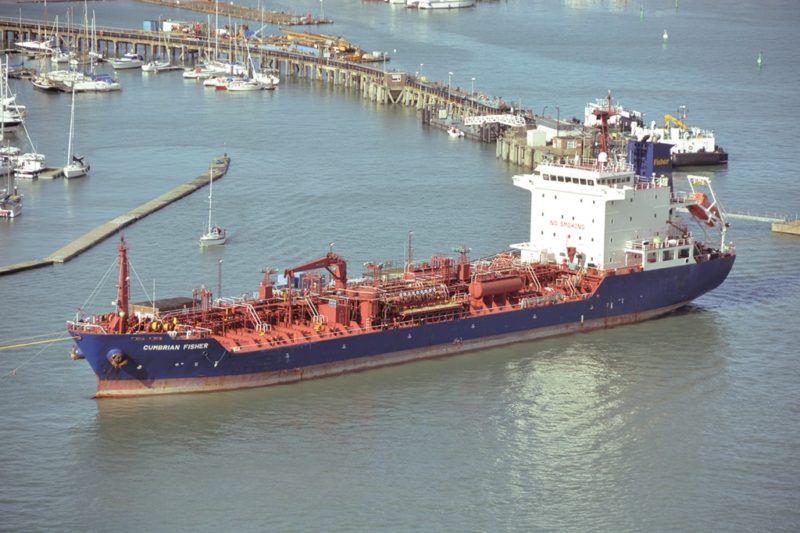
The JFE coastal tanker pool was two dozen ships in September 2008, which was trimmed back to eighteen coastal tankers in August 2011. Pre-tax profits per year for the three Fisher Divisions in 2010 totalled almost £30 million at this point in time. Some of the many services that these three Fisher Divisions offer today are:-
Marine Division
A large coastal tanker fleet is operated in 2023 of eighteen ships, including two new LNG powered tankers of 6,000 dwt ordered in 2020 from the China Merchants Jinling yards in China. The steel cutting of the first vessel took place in August 2021, and the tanker was delivered towards the end of 2022 as Sir John Fisher. The second sister tanker was delivered in 2023 as Lady Maria Fisher, named after the wife of Sir John Fisher. This pair are clean petroleum product (CPP) tankers built to IMO II tanker standards, and can run on LNG or conventional marine gasoil on a ‘dual fuel’ basis.
The deep sea tanker Maersk Raleigh of 35,191 dwt was purchased in 2019 for £9 million and renamed Raleigh Fisher for a five year contract to the Ministry of Defence to support the Royal Navy fuelling requirements. She currently supplies oil products to U.K. Government bases on Ascension Island, Akrotiri in Cyprus, and Loch Striven fuel depot, with an arrival at Ascension on 27th January 2023. The Royal Navy refuelling tanker Oakleaf had ended her long, profitable bareboat charter on 12th March 2007 when she arrived for the last time at Portsmouth for decommissioning. She had been purchased by Fishers in June 1985 for £7 million, and arrived for breaking up at Aliaga in Turkey on 22nd October 2010.
The coastal tankers are Clyde Fisher (12,984 dwt), Cumbrian Fisher (12,921 dwt), Pelican Fisher (9,576 dwt taken on an eight year bareboat charter from a Singapore company as Anuket Amber in August 2021), Kestrel Fisher (7,062 dwt purchased as Damen Bergum), King Fisher (7,067 dwt purchased as Ouse), Corrib Fisher (6,090 dwt purchased as Bomar Pluto), Solway Fisher (5,421 dwt), Shannon Fisher (5,421 dwt), Mersey Fisher (4,765 dwt), Dee Fisher (4,653 dwt), Seniority (4,430 dwt), Superiority (4,487 dwt), Speciality (4,426 dwt), and the sisters Sarnia Liberty and Sarnia Cherie of 3,532 dwt completed in 2007/08 as Vedrey Thor and Vedrey Tora. The latter pair of tankers supply the Channel Islands and the Scottish Highlands and Islands with fuel.
The Fendercare Marine subsidiary acquired in 2005 for £15 million provides vessel fendering solutions to large and small tankers engaged in transhipment operations, as well as to all of the world shipping fleet moored in port to stop hull damage when ships ‘range’ along the quay. Fendercare Marine Middle East has partnered with Energy Services Co. Ltd. of Saudi Arabia to supply fender systems in the Persian Gulf. Fendercare conducted successful LNG ship-to-ship transfers in November 2021, having invested in a LNG transfer system earlier in 2021. These transfers are complex as the tankers are pressurised with LNG transferred at minus 161 degrees Centigrade and evaporation (boil off gases) carefully managed. The year of 2019 saw a series of acquisitions including Martek Marine Gas Detectors, SM Continental Diving and ROV Services for FPSO tankers and offshore oil terminals, and Ortega Submersibles to transport divers in a safe environment, and to further enhance Fisher niche capabilities.
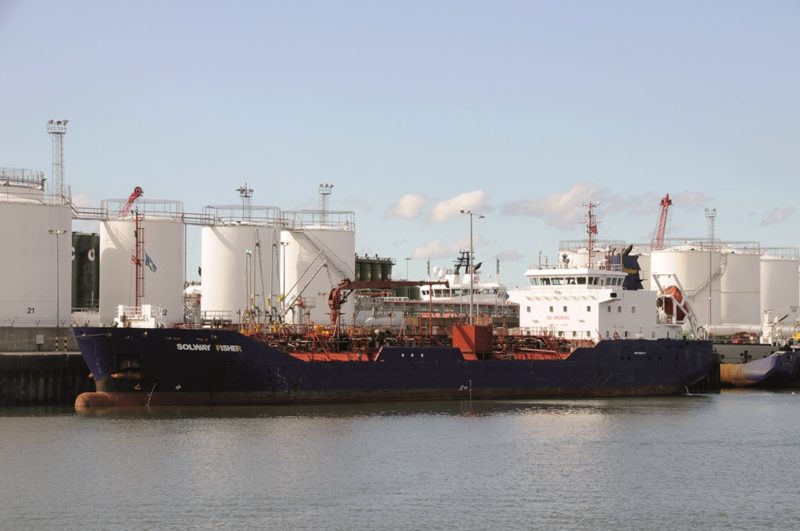
British Nuclear Fuels Ltd. (BNFL) had been set up in 1971 as a subsidiary of the United Kingdom Atomic Energy Authority (UKAEA), and when the Fisher nuclear reprocessing ship management contract was taken over by Serco Marine Services, Fisher appointed Angus Cockburn, Chairman of Serco, in January 2021 as its new Chairman. Pacific Nuclear Transport Ltd. (PNTL) owned 65% by INS, a Japanese consortium (25%) and TN International (10.0%) currently operate three nuclear irradiated fuel carriers in Pacific Heron, Pacific Egret, and Pacific Grebe, all of 4,916 dwt with four holds for carrying twenty flasks and a service speed of 14 knots and built during 2008/10.
The five previous ‘Pacific’ carriers of PNTL have all been broken up, with Pacific Crane and Pacific Swan at Gravendeel in Holland in 2004/05, Pacific Teal at the same location in 2008, and Pacific Sandpiper in Belgium in 2011. Pacific Pintail was laid-up for two years from 2010 and 2012, but was then reactivated in 2012 and renamed Oceanic Pintail for further service until she was decommissioned in November 2020 and then broken up at Leith in 2021. Atlantic Osprey was purchased by BNFL in 2002 as the ro-ro Arneb, and converted to a packaged nuclear materials carrier, serving for a dozen years until arriving for breaking up at Swansea on 19th August 2014.
Mediterranean Shearwater was another nuclear fuel carrier that was renamed European Shearwater n 1994, and arrived for breaking up at Gravendeel on 20th September 2009.
Subtech of Durban was purchased on 4th March 2015 for $5.18 million with a further possible $14.87 million if the company achieved profit targets up to 2017. Subtech was founded in 1995 and operated in South Africa, Mauritius, Mozambique, Namibia, Angola and Tanzania, and clients included BP, Shell, Subsea 7, Technip, Oceaneering, Boskalis, Maersk, Svitzer, Titan, Dormac, Saipem, Bourbon and NPCC of Saudi Arabia. JF Subtech offers diving support, subsea construction and subsea projects e.g. Triton Knoll Offshore Wind Farm, other subsea construction and decommissioning projects, and diving support services are being provided at the Sizewell B nuclear power station.
The JF Subtech fleet has included offshore tugs, and four vessels have been owned for specialist subsea work in Subsea Swordfish of 5,372 grt and 4,387 dwt with dimensions of 104.0 metres by 19.0 metres and built in 2019, Subsea Paladin of 5,648 grt and 4,600 dwt with dimensions of 103.0 metres by 19.0 metres, Deep Cygnus of 9,600 grt and 7,877 dwt built in 2009 by the Bergen Fosen yard with dimensions of 122.4 metres by 22.0 metres, and well stimulation vessel Go Electra of 4,071 grt and 3,123 dwt with dimensions of 79.7 metres by 16.4 metres by 6.22 metres and built in 2012. The James Fisher Group acquired the entire share capital of Subtech Group Holdings in January 2023.
Energy Division
James Fisher offers a variety of energy services to the oil, gas and nuclear energy sectors, and has also introduced innovative solutions to the expanding renewables sector. The Dart Fisher offshore support vessel of 174 grt services the Galloper Offshore Wind Farm (OWF) fifty miles off Felixstowe, and has a refuelling rate of 170 litres per minute with a tank capacity of 25,000 litres. Three long term contracts were won in 2022 for transmission maintenance services to three Offshore Wind Farms (OWF) at Thanet, Humber and Gwynt-y-Mor. James Fisher Strainstall received approval to use its Container Weighing Systems in all EU and New Zealand ports in 2021. JF Testing Services (JFTS) was sold in November 2021 to the Phenna Group for £5.7 million with testing laboratories in Warrington, Harlow and Portlaise (Ireland) for the construction industry.
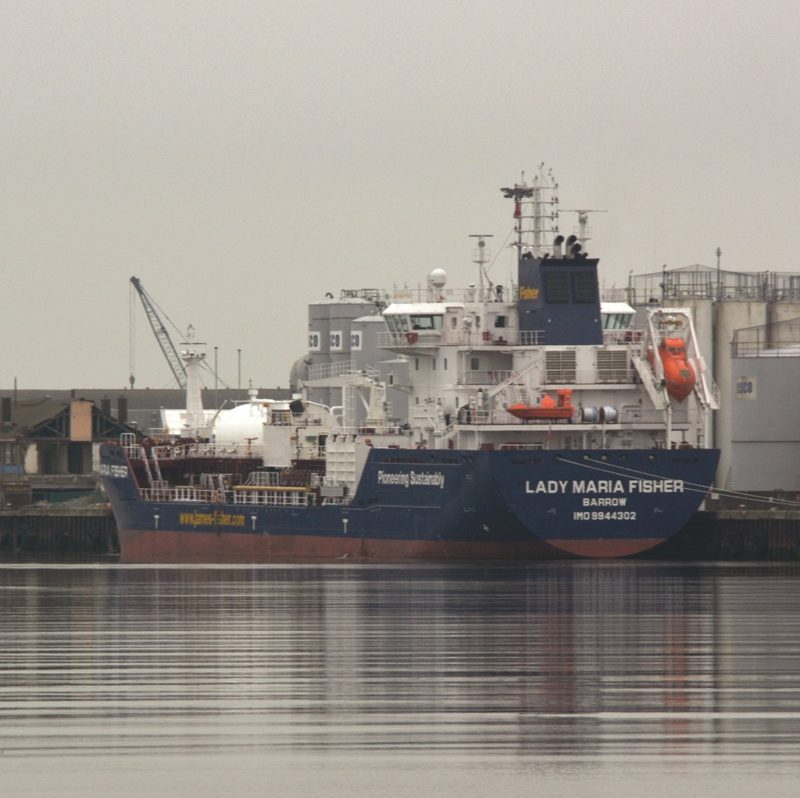
Defence Division
James Fisher is a world leader in the provision of submarine rescue systems, as well as specialist defence operations and technical solutions, diving equipment, and engineering for the global defence industry. In January 2023, JF Defence won a five year £63 million contract for submarine rescue services to the U.K., French and Norwegian navies, with the contract to start in the summer of 2023. Some 1,700 systems for Personal Life Support Systems have been sold worldwide to many Government Defence Ministries, as well as defence equipment such as Tactical Diving Vehicles (TDV). A new patient ventilator system has been offered to Governments worldwide to support chronically ill patients with breathing difficulties or with Covid 19 symptoms.
James Fisher & Sons PLC celebrated 175 years of operation during 2022, and today it is a global provider of tanker shipping, oil, gas and nuclear power engineering solutions including renewable energy, and equipment for the defence industries. The market capitalisation of the James Fisher Group is over US$1.3 billion, with 150 majority owned subsidiaries, and another 25 subsidiaries with 45% to 50% ownership.

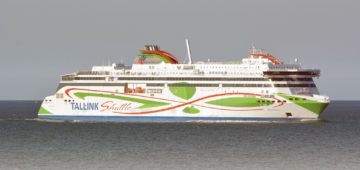


Comments
Sorry, comments are closed for this item